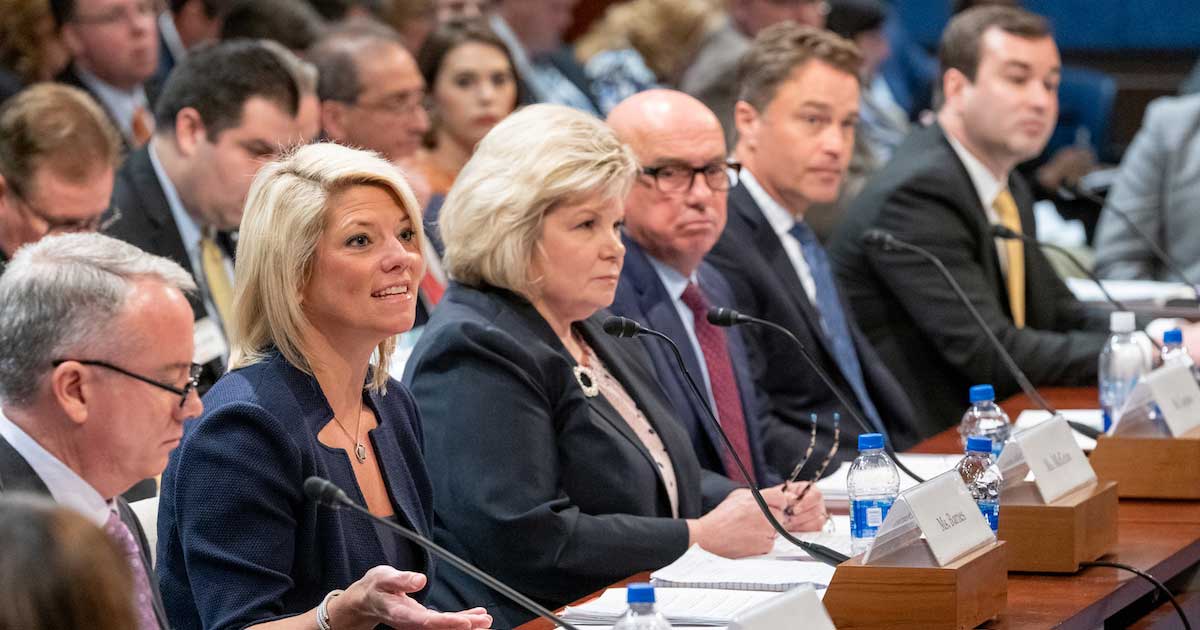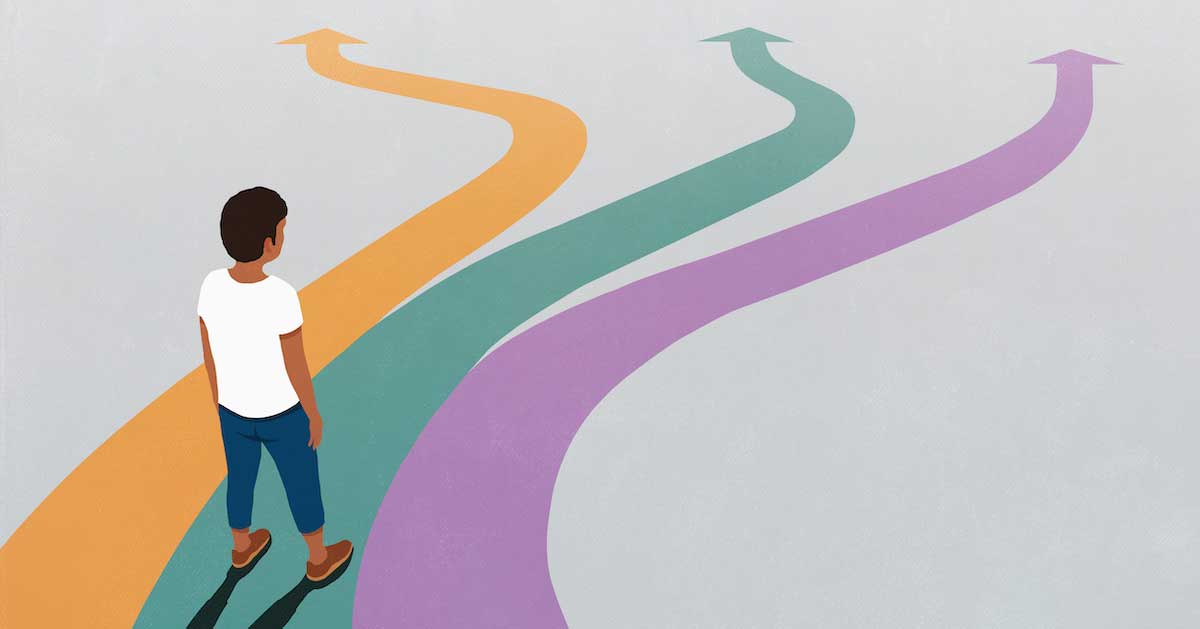This article is from the January issue of The Meeting Professional, which features an advocacy theme and is sponsored by Caesars Entertainment. Look for the full issue later this week. Pictured: U.S. Travel’s Tori Emerson Barnes testifying on Capitol Hill.
Advocacy. What does that really mean, especially when it comes to the meeting and event industry?
The textbook definition seems simple enough: public support or recommendation of a particular cause or policy.
We know, however, that little is simple these days in the global economic and personal upheaval thrust upon our families, our livelihoods, our communities and our way of life due to the effects of the COVID-19 pandemic.
Meetings and events, travel, hospitality, hotels and even the basic, innate need for face-to-face interaction have all been stifled in ways unimaginable, especially coming off a decade of economic growth.
While news of vaccines is encouraging, know this: It is advocacy—from the White House through the halls of Congress to statehouses to city halls—on behalf of the meeting and event industry that could very well determine the swiftness of recovery.
“People have to take responsibility and advocate on their own behalf.”
From the U.S. Travel Association to the Meetings Mean Business (MMB) coalitions in the U.S. and Canada to the c-suites of every industry association and organization, advocacy on behalf of the industry is paramount not only to survival but to stability, growth and prosperity. Advocacy is important every year, but never more vital than now.
“We had 10 years of incredible, unmitigated success in our industry,” says Nan Marchand Beauvois, senior vice president of membership and industry relations at the U.S. Travel Association, general manager for U.S. Travel’s Educational Seminar for Tourism Organizations (ESTO) and managing director of MMB. “Positive numbers, year after year success, year after year gains.
“You kind of get into this rut of daily business because everything is going so well,” she says. “Why would you think of the unthinkable? But what this has shown us, and I hope what it will do to change some behaviors a little bit, is that people have to take responsibility and advocate on their own behalf. You do it in your personal life and you need to do it in your professional life. You have to understand the importance of what you do. It goes beyond always being successful or not, because when push comes to shove, you need to be able to explain why it’s important to someone who has the power to help you. You’ve got to be able to tell your story.”
Here is just part of that story. This in an industry that ranked as the 13th-largest global economy, according to the 2018 Global Economic Significance of Business Events study, a report that concluded business events generated more than US$1 trillion in direct global spending and 30 million jobs worldwide.
According to the Bureau of Labor Statistics, there were nearly 17 million U.S. jobs in leisure and hospitality in February 2020. By April, the number was cut nearly in half to 8.6 million as the pandemic brought the industry to a halt as infection rates increased and limits on crowd sizes kept face to face, with few exceptions, at a minimum.
The industry had been under siege before and took an important step in 2009 when meeting and event industry leaders rallied to form MMB, created in 2009 by U.S. Travel, which is led by President and CEO Roger Dow. The goal was to showcase the value that business meetings, travel and events bring to the U.S. economy and to provide resources, tools and information to show the real impact the meeting industry has on businesses, economies and communities. The group re-launched with a sustained campaign strategy in 2014.
So, when COVID struck, it was U.S. Travel, among others, leading the charge behind Dow, Beauvois and Tori Emerson Barnes, executive vice president for public affairs and policy. Key initiatives were launched and important legislation was passed, including the following.
· The COVID RELIEF NOW Coalition aimed to show Congress the massive toll the pandemic was having on the travel industry and industries supported by travel. More than 300 public- and private-sector companies representing a diverse cross-section of the country came together to respectfully demand that Democrats and Republicans work together to pass additional COVID economic relief legislation. The message was that small businesses were perishing and without relief, millions of American jobs were on the line.
· The Let’s Go There Coalition is a national initiative to encourage Americans to think about their future travels and make plans to go when the moment is right. The message is straightforward: When the time is right for Americans to travel again, the industry will be ready to safely welcome them back.
· Travel in the New Normal and Travel Confidently offered industry guidance for promoting healthy and safe environment for travelers and travel workers.
· The CARES Act, the largest economic relief package in U.S. history, was signed into law on March 27 and included major provisions U.S. Travel fought for that deliver economic support to travel businesses, travel workers and their families.
· A COVID-19 recovery funding package signed into law in December included numerous provisions to help bring economic activity and jobs back to the travel and tourism industry, including a second draw on Paycheck Protection Program funds for the hardest-hit businesses, eligibility for non-profit destination marketing organizations, assistance to airports/concessionaires/airlines and enhancements to the Employee Retention Tax Credit, among many others.
“The aggressive and coordinated advocacy strategy we implemented, working with every sector of our industry, paid off and we celebrate together the many measures included in this legislation that provide federal support for travel workers and businesses of all sizes,” Dow says. “This legislation is a lifeline for businesses and workers who have been hanging on by a thread.
“Seeing this bill make it across the finish line is a huge relief after months of struggle. We will continue to fight for our industry and work to safely restart travel. Ultimately, it is our industry that will help to rebuild the U.S. economy and the American workforce.”
With a new presidential administration taking office in Washington, industry advocates have already been meeting with the transition teams to ensure that no momentum is lost as Congress continues to consider additional relief bills. Has it made a difference?
“What we’ve learned from this is the more that we can be united, and the more that we can advocate and be holistic in our approach, there is a real recognition of the impact on our industry,” Barnes says. “When it comes to doing business, nothing replaces meeting in person. With business and convention travel grinding nearly to a halt since March, we are understanding more than ever the interpersonal connectedness that folks are really missing. We see members of Congress that recognize that, too. It is so important for the industry to continue to activate and to be willing to engage your elected officials, and that’s not just on the federal level—it’s your local officials, your state officials. Governors matter, mayors matter, state legislators matter and the more that they’re aware of the condition of the industry and what can bring us back, the faster that we’ll get there.”
Get Involved: Meetings Mean Business
The pace of progress has been painfully slow as the industry remains mostly shuttered.
Michael Massari, chief sales officer at Caesars Entertainment, will serve as co-chair of MMB in 2021 along with Fred Dixon, president and CEO of NYC & Company. Massari just wants fairness.
“The only priority is to gain permission to operate,” he says of MMB initiatives. “We need to gain legislative permission to execute great meetings and events. The challenge, from my perspective, is I just don’t think we’ve been given a level playing field. We’re not asking for a free pass in the meeting and event industry by any means. We’re just asking to operate under the same rules and regulations that other industries can operate at—for example, hotels and restaurants can operate at [a much higher] percent occupancy.”
Dixon reiterates that MMB will further intensify advocacy efforts among business leaders and policymakers to raise awareness of the industry’s value and push for the protection and stimulus measures that the meeting and event industry so greatly needs.
“Michael brings an inspiring vision for the future of the meeting and event industry,” Dixon says. “His expertise and connections with key players inside our industry, the broader business community and in various levels of government will be crucial for ensuring the meetings economy comes back stronger in the wake of COVID-19. I greatly look forward to leading the coalition together.”
Clark Grue, CEO at Rainmaker Global Business Development in Calgary, Alberta, and 2020-2021 chair of MMB Canada, echoes the priorities.
Get Involved: U.S. Travel Association
“As we continue to build the coalition across the country, one of our most important goals will be to increase our advocacy within the provincial boundaries,” he says. “Supporting the business events industry in each province will be very important as we continue to elevate awareness of the industry and the professional nature of those operating within business events.
“Meeting professionals have been frustrated all year,” he says. “At this stage, as we close out the year, they are exhausted and uncertain of what their industry will look like in 2021 and 2022.”
The same is true for meeting professionals worldwide, as Europe, Mexico, Asia and others have all been severely impacted.
Through it all, the importance of face to face, that human interaction, is at the heart of why business meetings and events need to return.
“The reality is that some component of virtual or hybrid meetings will remain in 2021, but nothing replaces face-to-face meetings and the ideas and camaraderie generated in person,” says Elliott Ferguson, president and CEO of Destination DC. “So, we’re focused on safety and the mechanisms in place that will rebuild consumer confidence and bring the meeting industry back.
“Advocacy is critical on a local, state and federal level to continue bringing awareness of what our industry does for the economy,” he says. “I’m fortunate to work closely with the U.S. Travel Association and their efforts to advocate on behalf of our industry. They have several efforts in the works to keep business travel, events and meetings top of mind. Top of mind are relief efforts and ways to jumpstart the industry when the time is right, such as tax credits for organizations planning meetings. As an industry, we can rally behind sharing why meetings mean business and lead to better business and economic outcomes.”
What can meeting professionals, those in the trenches battling for their jobs and for business, do to help advocate for the industry?
“All politics are local and that’s why the grassroots activation [is important]—making sure that our members understand what it means to them as a business so that then they can turn around and be advocates on behalf of their own businesses and their industries and their cities,” Beauvois says. “That’s connecting the dots from what we do here in D.C. down to how that is relevant to someone sitting in Spokane (Wash.), Bend (Ore.) or Wichita (Kan.) Why is that important? So, they have to understand the importance of the industry not only on a national level, but also what it means to them locally, because that’s important as well.”
Massari urges meeting professionals to join an organization.
“Be active outside the industry to advocate as well,” he says. “People may struggle with what being an advocate means. It’s an organic process. Be involved inside our industry and outside our industry. Take the time to explain what the meetings business is all about. One of the best things about our industry is also our Achilles heel. We have many people across so many different companies, often small businesses, that make up our great industry. It’s hard to get everyone active and engaged. We just need more people to be involved.”
There remains a long recovery ahead, but things will improve.
“It’s going to get better a little bit every day or every quarter perhaps,” Beauvois says. “Resiliency is overrated, but it’s important, and it’s critical. Everybody’s been pushed this year and in so many different ways, and you need to be able to be resilient.”
Maybe there is a better definition for what advocacy means to the meeting and event industry. It’s about being resilient and having the courage, independence and passion for things that matter, and face to face matters.
Go to mpi.org/blogs to see our full interviews with Nan Marchand Beauvois and Tori Emerson Barnes.







